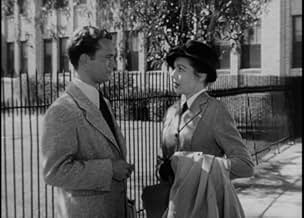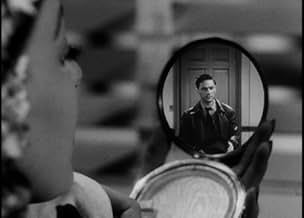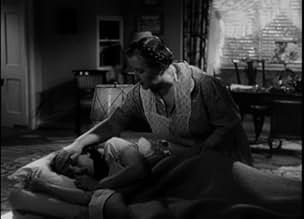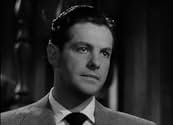IMDb RATING
6.8/10
1.2K
YOUR RATING
A beautiful psychology professor tries to hide a self-defense killing.A beautiful psychology professor tries to hide a self-defense killing.A beautiful psychology professor tries to hide a self-defense killing.
- Awards
- 1 win total
Billy Mauch
- Harry Brice
- (as Bill Mauch)
Eric Alden
- Detective
- (uncredited)
John Bishop
- Detective
- (uncredited)
Gladys Blake
- Boxing Fan
- (uncredited)
Barbara Brewster
- Miss Comar - Abe's Mother
- (uncredited)
Douglas Carter
- Detective
- (uncredited)
Featured reviews
The twist on what we now call sexual harassment lingers as the most interesting aspect of The Accused, an innocuous suspense story with some effective moments. Another lingering aftertaste is the midcentury stereotype of the female academic that's foisted on star Loretta Young -- and the viewer.
Psychology professor Young (!), guarded and old-maidish (she's even saddled with the glamourproof name Wilma Tuttle), becomes the object of the unhealthy attentions of one of her students (Douglas Dick). On the pretext of diving for abalone shells off Malibu, he spirits her off to a secluded lover's lane one night and forces himself on her. She bashes in his skull and fakes his death to look accidental.
Then she begins to attract more attention -- from Robert Cummings, a lawyer friend of the dead boy's family (he falls for her), and Wendell Corey, a dogged homicide cop. In the acting department, there's no contest; Cummings stays his usual namby-pamby self, while Corey delivers a strong, unsentimental performance, among his best.
Much of William Dieterle's direction shows a practiced hand. Especially well handled are the opening sequence of Young fleeing the crime scene, a boxing match where she suffers a flashback, and the ghoulish reconstructions of the murder by forensic pathologist Sam Jaffe.
But a glaring structural flaw keeps The Accused lukewarm. We know from the outset that Young acted in self-defense, which pretty well leeches all the suspense out of Corey's implacable pursuit; the tightening case against her packs no impact because it's safe to assume she won't be spending any time with those harpies from Caged. Consequently the film focuses more on her emergence from a cocoon of droopy skirts, a bun in her hair, sleeping pills and swooning spells into a seductive butterfly flitting into Cummings' net.
Dick, as the young narcissist, calls to mind such amoral charmers as Robert Walker in Strangers On A Train and John Dall in Rope (a film in which Dick also appeared). It's he -- not young nor Cummings -- who supplies what faint erotic spark this movie, about a sexually-based murder, dares to kindle.
Psychology professor Young (!), guarded and old-maidish (she's even saddled with the glamourproof name Wilma Tuttle), becomes the object of the unhealthy attentions of one of her students (Douglas Dick). On the pretext of diving for abalone shells off Malibu, he spirits her off to a secluded lover's lane one night and forces himself on her. She bashes in his skull and fakes his death to look accidental.
Then she begins to attract more attention -- from Robert Cummings, a lawyer friend of the dead boy's family (he falls for her), and Wendell Corey, a dogged homicide cop. In the acting department, there's no contest; Cummings stays his usual namby-pamby self, while Corey delivers a strong, unsentimental performance, among his best.
Much of William Dieterle's direction shows a practiced hand. Especially well handled are the opening sequence of Young fleeing the crime scene, a boxing match where she suffers a flashback, and the ghoulish reconstructions of the murder by forensic pathologist Sam Jaffe.
But a glaring structural flaw keeps The Accused lukewarm. We know from the outset that Young acted in self-defense, which pretty well leeches all the suspense out of Corey's implacable pursuit; the tightening case against her packs no impact because it's safe to assume she won't be spending any time with those harpies from Caged. Consequently the film focuses more on her emergence from a cocoon of droopy skirts, a bun in her hair, sleeping pills and swooning spells into a seductive butterfly flitting into Cummings' net.
Dick, as the young narcissist, calls to mind such amoral charmers as Robert Walker in Strangers On A Train and John Dall in Rope (a film in which Dick also appeared). It's he -- not young nor Cummings -- who supplies what faint erotic spark this movie, about a sexually-based murder, dares to kindle.
In The Accused, Loretta Young plays a psychology professor who kills an amorous male student in self-defense, then spends the rest of the movie covering up her crime. William Dieterle does an excellent job with the familiar material, and Miss Young gives a sympathetic performance. This is one of several crime pictures that Hal Walls produced in the late forties and early fifties, many of which fall into the noir category. Most of these films concern people with conflicted or tortured sexual urges, dysfunctional families, inadequate or just barely adequate men, with the women often hysterical or scheming. At the time this must have seemed daringly modern and contemporary. Now it just seems quaint, a waystation in the breakdown of small-town American values, with the action taking place in a netherworld between Andy Hardy and Tennessee Williams.
The movie is surprisingly sympathetic toward Miss Young, who, though on the cusp of middle age, still looks pretty damn beautiful. Robert Cummings is stronger than usual as her "suitor", while Wendell Corey is his inscrutably poker-faced self, as always, hinting between the lines, that had his character been better written he'd be more than up to the task. If this was so, I believe him. In a smaller role, Sam Jaffe is positively mephistopholean, delivering his lines as tartly as Corey, and in his lab scenes photographed to resemble a Dwight Frye hunchback from the thirties. A nice touch. The Accused is filled with nice touches, as Dieterle and most of his cast are much better than the script, breathing real life into it at times, which makes watching the movie a pleasure. There are no real surprises here, but lots of good scenes.
The movie is surprisingly sympathetic toward Miss Young, who, though on the cusp of middle age, still looks pretty damn beautiful. Robert Cummings is stronger than usual as her "suitor", while Wendell Corey is his inscrutably poker-faced self, as always, hinting between the lines, that had his character been better written he'd be more than up to the task. If this was so, I believe him. In a smaller role, Sam Jaffe is positively mephistopholean, delivering his lines as tartly as Corey, and in his lab scenes photographed to resemble a Dwight Frye hunchback from the thirties. A nice touch. The Accused is filled with nice touches, as Dieterle and most of his cast are much better than the script, breathing real life into it at times, which makes watching the movie a pleasure. There are no real surprises here, but lots of good scenes.
The Accused This is one of those popular story lines in which the killing is shown early on and then the film deals with the police trying to piece things together while the killer tries to look innocent.
In this case, the "accused" is a woman, played by Loretta Young. She plays a college teacher who defends herself against an obnoxious student but then makes the big mistake of trying to cover up the incident, even though it was self- defense, thinking it would look bad if she was discovered being with this student in the first place. (Today, we read true-life stories of worse, sad to say.)
Bob Cummings and Wendell Corey are detectives who know some foul play is involved but then Cummings, who gets increasingly annoying in here, falls in love with Young. He then winds up defending her in the short courtroom finale. Cummings gives a good example how "love is blind."
Corey, meanwhile, plays the determined cop who doesn't care what people think of him so long as he solves the crime. He is by far the most interesting of the characters in this film. Sam Jaffe also entertains in a supporting role as a crime doctor.
In this case, the "accused" is a woman, played by Loretta Young. She plays a college teacher who defends herself against an obnoxious student but then makes the big mistake of trying to cover up the incident, even though it was self- defense, thinking it would look bad if she was discovered being with this student in the first place. (Today, we read true-life stories of worse, sad to say.)
Bob Cummings and Wendell Corey are detectives who know some foul play is involved but then Cummings, who gets increasingly annoying in here, falls in love with Young. He then winds up defending her in the short courtroom finale. Cummings gives a good example how "love is blind."
Corey, meanwhile, plays the determined cop who doesn't care what people think of him so long as he solves the crime. He is by far the most interesting of the characters in this film. Sam Jaffe also entertains in a supporting role as a crime doctor.
This is actually a love story and, as is usually the case with noirs of the 40s, a very well written one, especially since it deals with some rather tricky psychological matters, of which guilt complex resulting in fear approaching the borders of possible schizophrenia is just one. What makes this film more than average of classy noirs of the 40s with a romantic and seriously psychological intrigue is the interesting peripatetic moment of the boxing match, when Loretta Young unintentionally gives herself away, and how very interestingly Robert Cummings as her lawyer and lover reacts to that. The acting is superb throughout, the story is credible and convincing, the dilemma of unintentionally having killed someone and the natural urge to avoid the consequences and take responsibility for what was not intended, anyone can understand and relate to. To all this comes Victor Young's endearing score fashioning the experience with a golden frame, the beauty of which increases all the time. In brief, this is a much underrated, unjustly forgotten and deeply human and interesting film, that deserves some intention after having been more or less buried alive since 50 years.
The Accused is directed by William Dieterle and adapted to screenplay by Ketti Frings from the novel "Be Still, My Love" written by June Truesdell. It stars Loretta Young, Robert Cummings, Wendell Corey, Sam Jaffe and Douglas Dick. Music is by Victor Young and cinematography by Milton R. Krasner.
Wilma Tuttle (Young) is a college professor who is prompted into an act of self defence when one of her students attacks her sexually. The damage done, Wilma covers up her crime and finds her conscience gnawing away at her, especially as she is actively involved in the police investigation
Good sturdy story is well played out by a good sturdy cast, The Accused makes up for what it lacks in noir visuals with noir infected psychological smarts. Helps that Wilma Tuttle is a strong characterisation in Young's excellent hands, the whole film hinging on the fact that Wilma's crime is perfectly understandable to us viewers, she has our sympathy, more so since she has the chance of love with Cumming's amiable and cunning lawyer.
We follow the police investigation through its various strands of science, with Wilma privy to what is going on as well. This puts a devilish kink to proceedings as Lieutenant Ted Dorgan (Corey) is pretty sure he knows what really happened (an inquest had previously ruled the death as an accident caused whilst diving).
Further spice comes with the knowledge that Dorgan also has the hots for Wilma, thus this puts Wilma in a whirlpool of fear and fret, conscience battering and the amorous attentions of two male suitors, both of whom are intricately bound to the investigation. Plus she's trying to keep it together at work whilst she's teaching her students psychology!
It all builds to a good conclusion, which is nicely open ended, to round production out as an entertaining noirish meller. 7/10
Wilma Tuttle (Young) is a college professor who is prompted into an act of self defence when one of her students attacks her sexually. The damage done, Wilma covers up her crime and finds her conscience gnawing away at her, especially as she is actively involved in the police investigation
Good sturdy story is well played out by a good sturdy cast, The Accused makes up for what it lacks in noir visuals with noir infected psychological smarts. Helps that Wilma Tuttle is a strong characterisation in Young's excellent hands, the whole film hinging on the fact that Wilma's crime is perfectly understandable to us viewers, she has our sympathy, more so since she has the chance of love with Cumming's amiable and cunning lawyer.
We follow the police investigation through its various strands of science, with Wilma privy to what is going on as well. This puts a devilish kink to proceedings as Lieutenant Ted Dorgan (Corey) is pretty sure he knows what really happened (an inquest had previously ruled the death as an accident caused whilst diving).
Further spice comes with the knowledge that Dorgan also has the hots for Wilma, thus this puts Wilma in a whirlpool of fear and fret, conscience battering and the amorous attentions of two male suitors, both of whom are intricately bound to the investigation. Plus she's trying to keep it together at work whilst she's teaching her students psychology!
It all builds to a good conclusion, which is nicely open ended, to round production out as an entertaining noirish meller. 7/10
Did you know
- TriviaOne of over 700 Paramount productions, filmed between 1929 and 1949, which were sold to MCA/Universal in 1958 for television distribution, and have been owned and controlled by Universal ever since. Its earliest documented telecast took place in Seattle Friday 24 October 1958 on KIRO (Channel 7); it first aired in Phoenix Friday 13 March 1959 on KVAR (Channel 12), and it soon became a popular local film favorite as it was first aired in Denver 9 April 1959 on KBTV (Channel 9), by both Chicago and Milwaukee 25 April 1959 on WBBM (Channel 2) and WITI (Channel 6), by Boston 10 May 1959 on WBZ (Channel 4), by Asheville 17 May 1959 on WLOS (Channel 13), by Grand Rapids 5 September 1959 on WOOD (Channel 8), by Detroit 22 September 1959 on WJBK (Channel 2), by Philadelphia 26 September 1959 on WCAU (Channel 10), by Los Angeles 3 October 1959 on KNXT (Channel 2), by Johnstown 30 October 1959 on WJAC (Channel 6), by Minneapolis 4 November 1959 on WTCN (Channel 11), by Toledo 20 November 1959 on WTOL (Channel 11), by Omaha 21 November 1959 on KETV (Channel 7), and by Pittsburgh 16 January 1960 on KDKA (Channel 2). It was released on DVD 28 September 2016 as part of the Universal Vault Series.
- GoofsWarren Ford invites Dr. Tuttle for breakfast, even though it is twelve noon, when lunch would be more appropriate.
- Quotes
[Wilma is dressed for a date.]
Warren Ford: It's remarkable! Your brains don't show a bit.
- ConnectionsFeatured in Frances Farmer Presents: The Accused (1960)
- How long is The Accused?Powered by Alexa
Details
- Runtime
- 1h 41m(101 min)
- Color
- Aspect ratio
- 1.37 : 1
Contribute to this page
Suggest an edit or add missing content






















